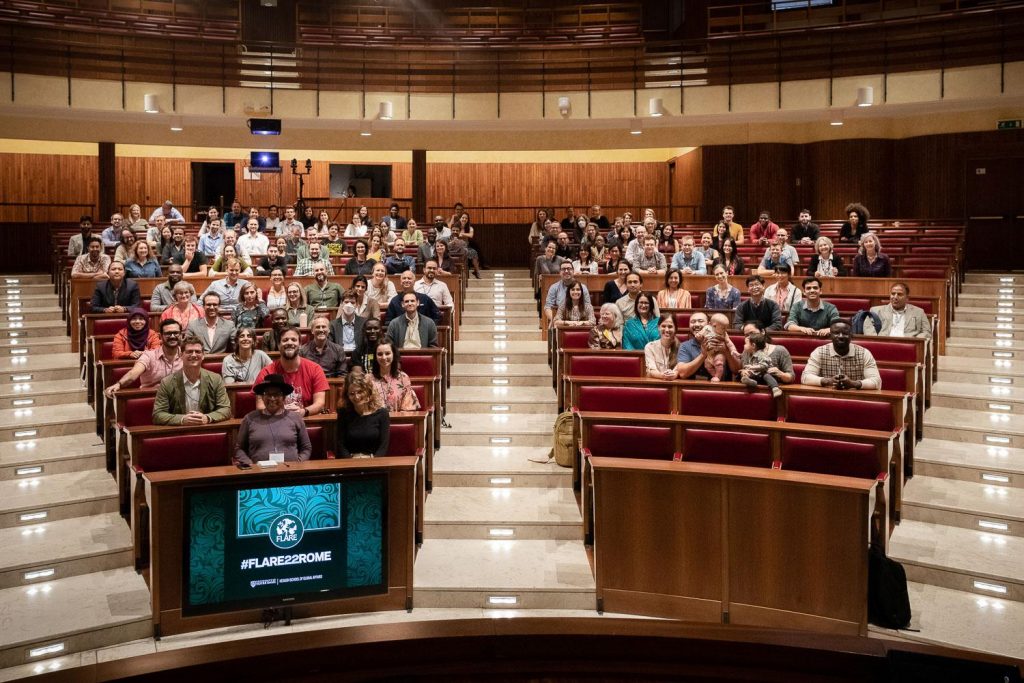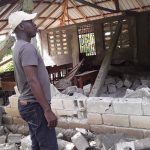
The Forests & Livelihoods: Assessment, Research and Engagement (FLARE) Network held its eighth annual meeting in Rome from October 7 to 10 at the Auditorium Antonianum and the University of Notre Dame’s Rome Global Gateway. Daniel C. Miller, associate professor of environmental policy at Notre Dame’s Keough School of Global Affairs and the coordinator of FLARE, began the gathering by welcoming more than 250 participants. Based at the Keough School, FLARE aims to advance knowledge at the intersection of forests and livelihoods and facilitate its application to policy and practice.

FLARE 2022 kicked off with a dynamic opening plenary roundtable during which a diverse set of speakers from research, donor, and practitioner organizations addressed the meeting theme: “Forests and Livelihoods in a New Era of International Commitments: The Promise and Challenge of Implementation.” Melania Canales Poma, president of the National Organization of Andean and Amazonian Women of Peru (third from right), highlighted that Indigenous Peoples and local communities (IPLCs) manage half the world’s land yet receive a miniscule share of funding for climate and biodiversity protection. She described the work and needs of her organization, which aims to empower women and IPLCS and protect forests in Peru.

Many organizations and networks were represented at FLARE 2022. Among them was the Food and Agriculture Organization (FAO) Forestry Division, whose session highlighted ways the FAO facilitates evidence-based decision making for improved livelihoods and sustainable forest management across the globe. The meeting featured more than 170 presentations that explored several major themes: biodiversity, forests, and livelihoods; social justice in the forest, including rights, power, and collaboration; and forest landscape restoration, with special focus on people, trees, and politics.

FLARE meeting attendees traveled to Rome from more than forty countries, making the 2022 annual meeting the most diverse in FLARE’s history. Previous annual meetings have been held in Paris, Edinburgh, Copenhagen, Stockholm, and Ann Arbor, Michigan.

Editors from the journals World Development, Global Environmental Change, Forest Policy and Economics, and Conservation Letters shared insights into the publication process and gave advice for early career researchers in a lively roundtable discussion. This session highlighted FLARE’s commitment to developing capacity within the network and providing opportunities for students and early career researchers to learn more about how to successfully promote their work.

Nancy Peluso, the Henry J. Vaux Distinguished Professor of Forest Policy at the University of California at Berkeley, delivered the conference keynote address: “Politicizing the Forest: History and Mobility in Mountain Java and Beyond.” She reflected on her more than three decades of research on the social and political dimensions of forests in Indonesia, highlighting new work showing how international migration has reshaped forests, livelihoods, and local power relations in recent years.

Along with the plenary events and journal editor session, meeting participants were able to network and lay the foundation for future partnerships to advance their work on forests and livelihoods. The meeting was FLARE’s first in-person meeting since 2019, giving attendees a chance to catch up with colleagues and friends as well as make new connections.

FLARE’s strength lies in its ability to connect scholars, practitioners, and policymakers with one another to pursue common goals through applied research, collaborative partnerships, working groups and more. In the above photo, Jesse Ribot, a professor at American University whose work focuses on environmental justice and rural well-being, led an interactive plenary event for meeting participants to propose new collaborative projects and invite others to join them.



